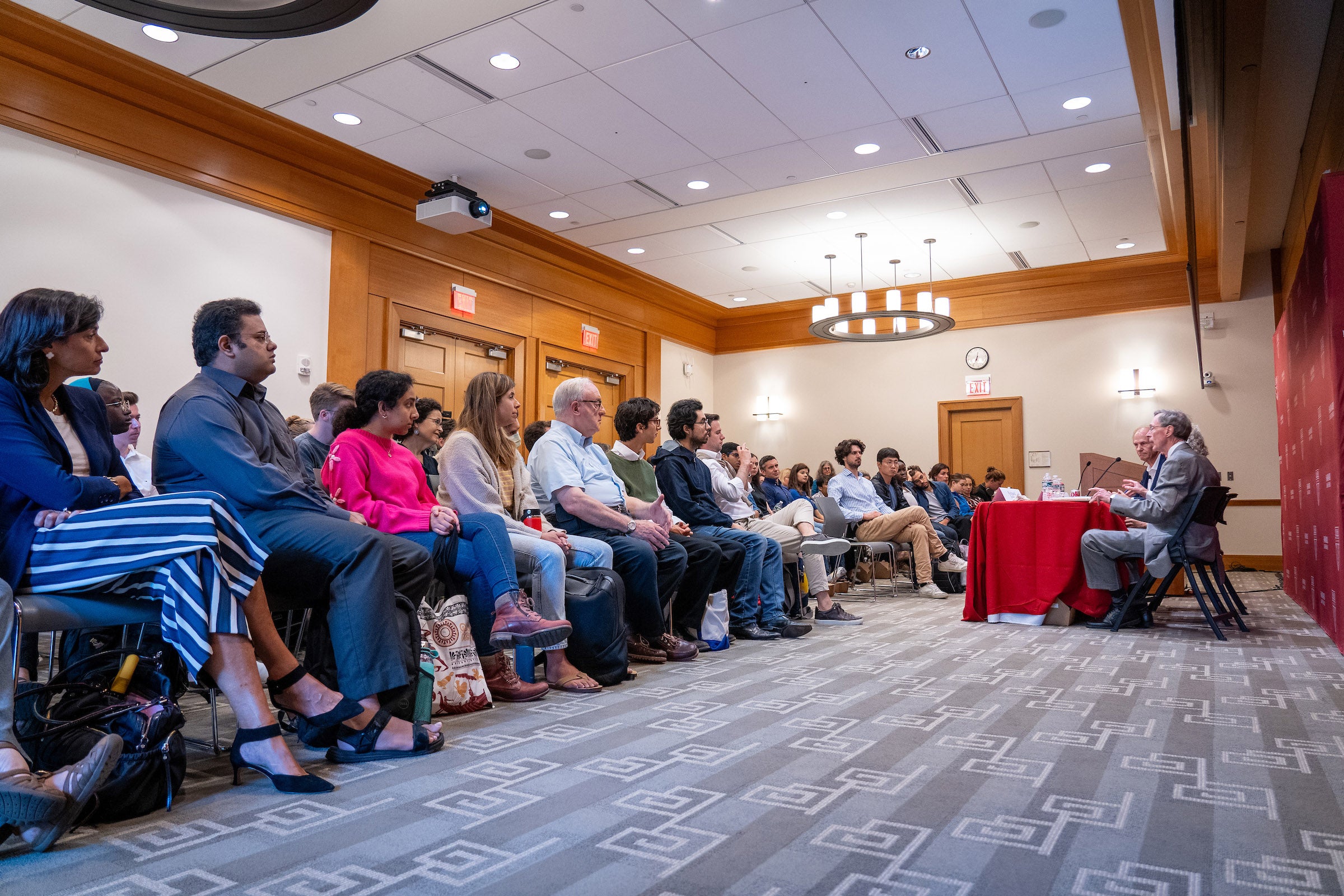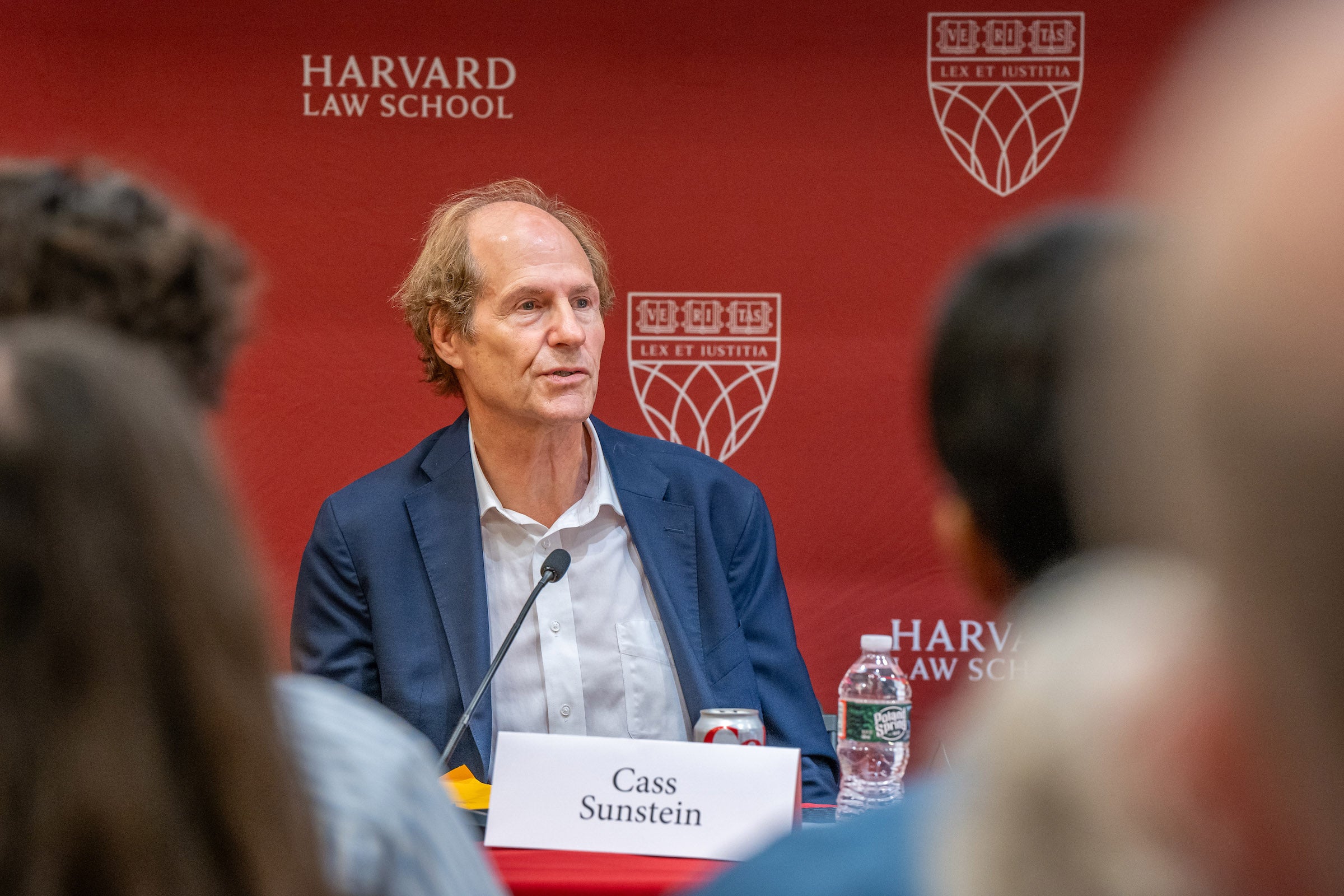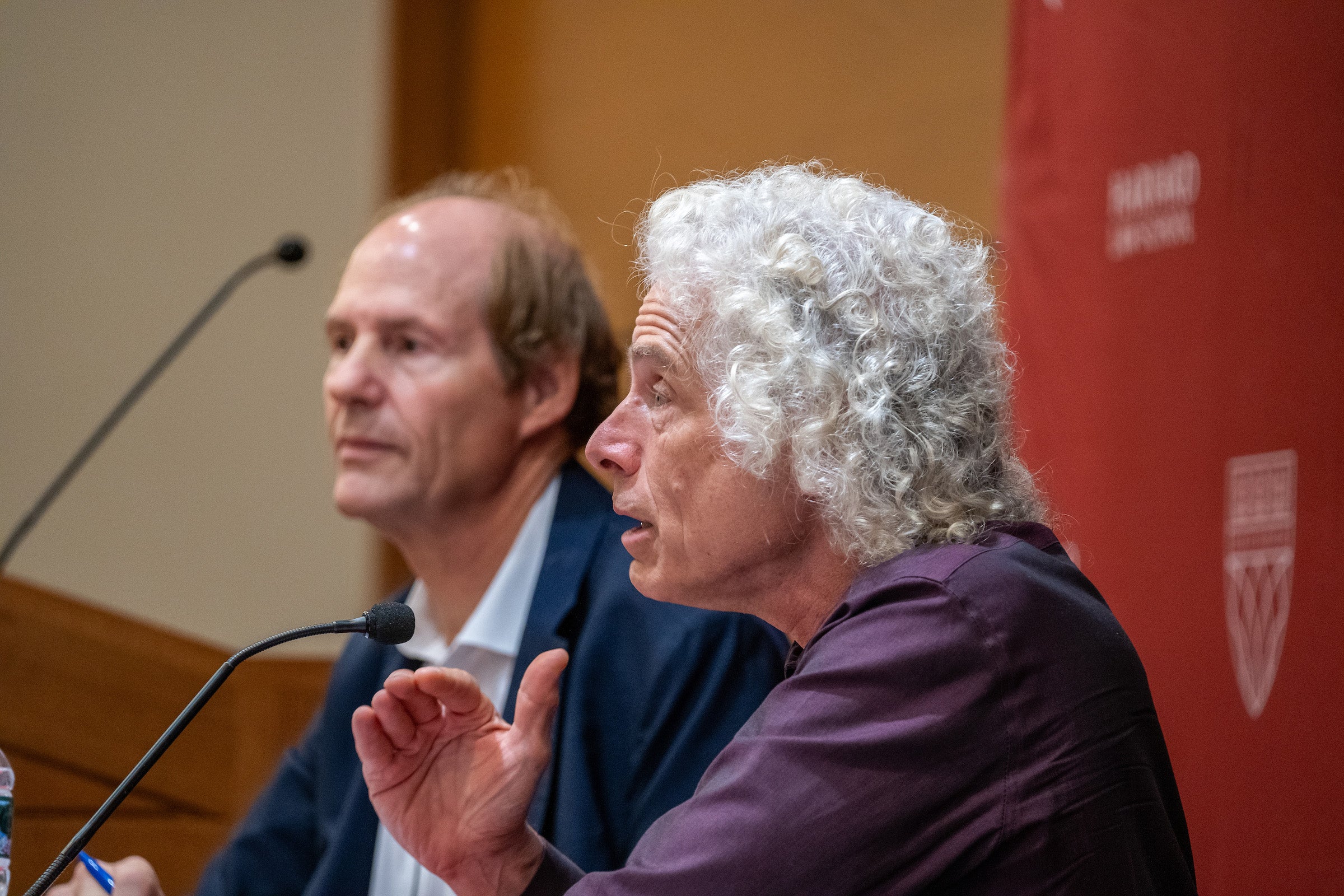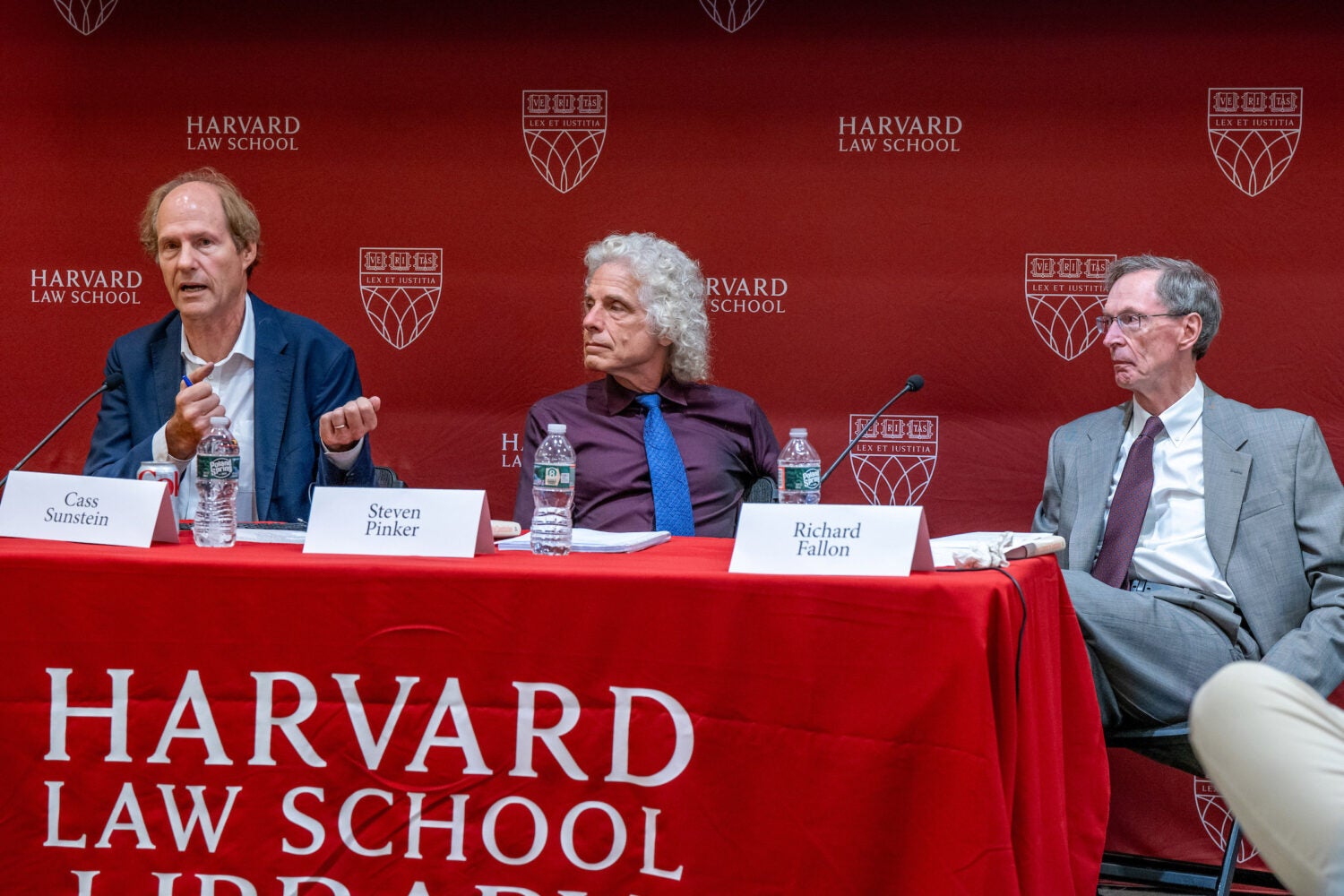In his new book “How to Interpret the Constitution,” Cass Sunstein ’78, Robert Walmsley University Professor at Harvard, argues that an interpretation should be based on the question of whether it would change American life for the better or worse. This idea was the springboard for a lively hour of discussion at a Harvard Law School Library book talk this week, including perspectives from Harvard psychology professor Steven Pinker and Harvard Law School Professor Richard H. Fallon Jr.
It is a “passionate book,” Sunstein ’78 said; and began the talk by outlining something he feels passionate about, a possible approach to law that he calls “experiments in living constitutionalism.” This he said, would be an approach that values individual freedoms — one that allows people in Missouri to have different practices from those in Connecticut. There would also be robust freedom of speech and religion, and personal privacy that allows both freedom from surveillance and privacy with respect to sex and reproduction. “Let’s just plant that flag as an idea,” he said. “It’s maybe six parts mischief and four parts proposal.”
The book, he said, promotes a theory of “choicelessness,” that each individual’s interpretation of the Constitution is based on certain “fixed points” that they believe are intrinsic to the Constitution itself. Those fixed points, he said, are “the commitments that each of us” he stopped and looked into the audience and said, “that is, you — find yourself least willing to give up with respect to constitutional law.” One may believe, for example, that it would be an abomination for the constitutional order to allow racial segregation, or to prohibit same-sex partnerships. These and other fixed points would influence how one interprets the Constitution.


When one is true to those fixed points, one achieves “reflective equilibrium” — a concept that Sunstein takes from the writings of political philosopher John Rawls. This is defined as a state of balance or coherence among one’s personal set of fixed points or beliefs. “We try to put our judgments in order. So that if there’s a theory of justice that entails the legitimacy of slavery, we’re going to be reluctant to accept it,” he said.
He outlined a few theories that have come in and out of fashion over the years. One was that of “semantic originalism,” meaning that the semantic meaning of the words in the Constitution is binding. Phrases such as “executive power,” he said, will continue to have the semantic meaning they had when the Constitution was written, and this is “an extremely appealing idea.” Less durable, he said, is the theory of “original expectations originalism,” which argues that the expectations held by the authors of the Constitution are decisive, rather than just the actual words. This, he joked, is “something the cool kids in the room no longer believe in.” Other theories hinge on interpreting the Constitution to promote the common good or the reinforcement of democracy; he named Ruth Bader Ginsberg as a proponent of the latter.
One enduring problem, he said is that “the Constitution doesn’t contain instructions for its own interpretation.” Thus a figure like James Madison could reject originalism in his youth and embrace it many years later. “The fact that Madison young deviated from Madison old would make it challenging to say that one of them was unfaithful to the Constitution, rather than that the two [merely] had diverging views.”
“The fact that Madison young deviated from Madison old would make it challenging to say that one of them was unfaithful to the Constitution, rather than that the two [merely] had diverging views.”
Cass Sunstein
He closed by presenting the book as a “cautious bet” on an open, non-originalist future. “Don’t be fooled by the claim that any particular theory of constitutional interpretation is required. Instead think, ‘What kind of constitutional order would the proposed theory of constitutional interpretation yield?’ That’s the only game in town.”
Playing devil’s advocate, Pinker pointed out what he saw as a couple of small pitfalls in the book and larger ones in the legal system. He noted that the courts have often “worked backwards” from the constitutional interpretation that they already favor, for reasons that may be personal, tribal or political. “They retroactively invoke the theory of constitutional interpretation that vindicates whatever they wanted to be true in the first place. In cognitive psychology that’s known as motivated reasoning. And I think that Cass argues for a sophisticated version saying that’s actually okay.” He concurred with Sunstein that there exists an “arc of justice,” a drive toward moral progress, but said this doesn’t need to be achieved through constitutional interpretation. “The alternative is to change the Constitution or write new legislation. Don’t try to improve morality by the subjective interpretation of a bunch of flawed people.”
He also challenged Sunstein’s idea that the Constitution can be interpreted in ways that make American life better and worse. Citing the political philosophers Thomas Sowell and Edmund Burke he asked, “Who is the omniscient genius who knows how to make life better or worse? You have to be a little more specific than that; you’ve got to have predictable laws that people know how to follow.” While amending or changing the Constitution may advance the arc of justice, history has proven this to be a difficult thing to accomplish. This brought him around to an agreement with Sunstein. “As a kind of kludge or stopgap, we’ll have to have flexible interpretation because we are kind of stuck with the Constitution.”
“The alternative is to change the Constitution or write new legislation. Don’t try to improve morality by the subjective interpretation of a bunch of flawed people.”
Steven Pinker

Fallon expanded on the theory of reflective equilibrium. Why, he asked, would one even need to achieve this? He proposed a few answers: One is that it is just “psychologically uncomfortable” not to have your case-by-case intuitions aligning with your overall, theoretical view. A loftier reason, taken from Rawls’ writings, is that “truth with a capital T” can more easily be reached through pursuit of reflective equilibrium — yet Fallon noted that even Rawls ultimately saw this as too grand a goal. Instead, Fallon argued that reflective equilibrium should have a more practical foundation: “It can and should be done in such a way that decision-making pursuant to the theory of constitutional interpretation that somebody arrives at is one that ought to command the respect of all other reasonable people in the society.”
This, he said, would place constraints on how one can “do” reflective equilibrium; certain beliefs (such as those held by Adolf Hitler, he said) would be excluded as “garbage in, garbage out.” The ideal, he said, is that reflective equilibrium would be tempered by sound judgment — an idea he suggested that both Rawls and Sunstein would approve.
